I’m delighted to offer the latest in the series of conversations with Very Interesting People — and this one’s very close to home, in the shape of my actual wife, Paula Grainger. In addition to being the best person I know (or have even heard of, except in obscure Belgian legends), she’s an experienced practitioner of herbal medicine, and therapist, and generally wise in all things… with the possible exception of her taste in husbands. More information about her work can be found on her website.
We had a long conversation about all of this to mark the launch of her new book, Nature’s Apothecary, published today in the US (and here’s a link to the UK edition).
MMS: I know you’ve been fascinated by plants your whole life. I wondered if you had any thoughts about why that was, where the initial interest came from — and if you can pinpoint the moment where you started to become interested in them in a medicinal way... or had that always been part of the appeal?
PG: I think a lot of it came from my grandmother and my mother. My grandparents lived in the house my grandmother’s father built shortly before he died, when she was in her early twenties. It had quite a large garden, with fruit trees they’d planted, a vegetable garden, two small greenhouses — and always lots of flowers, as she’d trained and worked as a florist before marrying. We lived very nearby and like my mother and uncle before me, my childhood was spent in that garden. I knew every inch of it — even now I could still draw you a plan with every plant in the right place.
Like many Brits of their generation who’d lived through the war and rationing, my grandparents were skilled gardeners. In my 1970s childhood and for at least a decade after that, they and my mother grew most of the produce our family ate. My grandmother bottled and preserved things, made jams, even made the wine they drank — from fruit and flowers like dandelion and elderflower, foraged from the nearby meadows. It was just what they did.
I spent hour after hour in that garden, playing invented games with my younger brother, Myles, and also my uncle, Robin, who was only 19 when I was born and was an engineer who made go-karts and swings for us. I was my grandmother’s little helper, trotting behind with my watering can, helping plant and harvest and pick flowers. And I guess she chatted to me while we worked, sharing the names of the plants — I can’t remember a time when I couldn’t identify what I saw growing around me.
My mum had followed in their footsteps and was also a keen gardener, so I had the garden at home to play and learn in too. It sounds strange now but I grew up playing with plants, my mother taught me how to position a thick blade of grass between my thumbs just right so that I could blow through it to create a piercing whistling sound. I made daisy chains and pinged plantain flower heads. As I grew a little older, I’d take myself off for moody teen walks in the local woods (it was a different time) with a book in my pocket and invariably return with leaves or flower stems as a bookmark.
I can’t pinpoint when I started to think of plants as medicines. My family certainly didn’t use herbs in that way. I do remember, probably aged around ten, concocting plant ‘medicines’ for my guinea pigs, usually some dandelion or a piece of groundsel wrapped in an apple leaf. And I loved my grandmother’s handwritten recipe book, which had things like nettle rinse for dark hair and chamomile for blondes.
As soon as I left home I started growing herbs in pots, with varying levels of success, schlepping them from rented house to rented house. In my twenties I was given a book about herbs and I do remember poring over it and starting to experiment.
As you know, I then went into the corporate world and worked in marketing and PR right up until my mid-thirties, when I suddenly had an epiphany on Kentish Town Road, in London. I think the timing may have had something to do with my mother and both grandmothers passing away over a six month period a few years before, and our own fertility issues. I certainly became more interested in health at that point. That was when I discovered the BSc Health Science: Herbal Medicine degree at the University of Westminster in London, and managed to persuade them to let me enroll — by taking evening classes in anatomy and physiology, because I lacked the prerequisites... and boom! I became a student of Herbal Medicine.
MMS: A couple of things strike me about that answer. The first is the degree to which you grew up surrounded by plants, and comfortable with them, raised in an environment in which flora were both assumed background texture but also regarded as something worth being interested in: I wonder if this was far more common in our childhoods than it is for most kids now. Then, we kids often wound up helping in the garden (at least initially) because there was nothing else to do: now there’s always a phone or videogame or endless homework.
It’s also noticeable that you cite your mother and grandmother — female relatives — as having the closest relationship to the garden and its plants. Obviously it’s not only women who care about plants — god knows there are plenty of male flower or fruit fans and obsessives, especially in the UK — but I wonder if that more generalized “the garden and the living things in it are my place” feeling is more common amongst women? And if so, do you think that might relate to the idea that in pre-history if was usually women who were the gatherers, rather than the hunters, and so an intimate knowledge of the plants around them was an important part of their role in the community, including knowing which plants had beneficial medicinal effects?
And so related to that, did starting to study herbal medicine feel like a whole new thing — or simply a way of deepening and expanding a love and fascination that was already there?
PG: That’s such a good question about how times have changed. There’s certainly a lot of evidence that kids, in the West at least, spend far less time in nature than we used to. A big part of it may be to do with smartphones and tech, but maybe parenting styles are a factor too. I mentioned above that I roamed the local woodlands in my early teens: I’m not sure parents of a 13 year-old girl would be relaxed with that these days. There’s a much greater perception of “stranger danger”, although in reality, I suspect the risks are pretty much unchanged, we’re just more aware of them.
Where a child grows up is also a factor. I’m sure even back in the seventies there were plenty of inner city kids in high rises whose exposure to plants was pretty limited. Here in Santa Cruz the culture is very outdoorsy and kids are encouraged to hike, bike, and play outside with their families and in schools — many of which have gardens.
I think the individual’s innate interests are probably the main factor. In the same way that you can give two kids a musical instrument and one will pick it up once and never look at it again, whereas the other will laboriously teach themselves to play. Some people are just drawn to certain things. After all, your many hours in your parents’ beautiful garden didn’t make you a plant lover – I mean, I know you like to be in a garden, but as far as I’m aware you’ve never planted anything.
It’s encouraging that I come across loads of young people who have an interest in, even a passion for, plants. Whenever I do a kids’ herb class I always get tons of sign-ups, and when I taught the herbal elective at Nate’s lovely K-8 school, I was always amazed by how engaged and interested the kids were. Some of those children are seniors in college now and I often hear from parents that they still remember things I taught in class, like smooshing yarrow and applying it to insect bites. That’s really inspiring. I do think schools have an important part to play in exposing children to nature. We partly chose Nate’s school, Gateway, because of its beautiful garden Life Lab where all the elementary science classes were taught. I know more schools are doing that here in California, but I don’t think that’s true across the board. I wish there was wider acknowledgement of the benefits of nature learning – art and music too, but that’s for a whole other conversation.
To your question about women having some kind of evolutionary connection to plants, at risk of wild generalization and gender stereotyping, I think we do. Also, perhaps, women are more drawn towards being carers and healers. The ‘women as gatherers’ thing is interesting and I think ties in with a greater awareness of natural cycles — from our menstrual cycles to the changing of the seasons. I just ‘know’ when, for example, the hawthorn will be flowering — and that’s helpful because the window for harvesting is short, only a week or two. I believe women map the world differently from men (again, in general). If you ask me where that tin of kidney beans at the back of the cupboard is, I’ll be able to tell you precisely. Whereas, even though you put most of the groceries away, unless it’s right there in the front row, you’ll have to hunt for it. I think that ties in with knowing what’s growing where and perhaps when humans were nomadic, it enabled women to quickly and efficiently find food and medicine when they returned to a place they hadn’t been to for a while. In fact, thinking about it, it makes me wonder if it was actually women who drove and directed their people’s migration?
As to how it felt starting to study herbal medicine, the degree I did was very science and medically-based, so the biochemistry, physiology, pathophysiology – all that was seriously hard work. The herbal bits were a different story, I know it sounds a bit woo woo but, if I’m honest, they felt more like some kind of remembering, rather than learning.
MMS: I wonder if a few of the things you touch on there can be tied together with the idea of “empowerment”. I certainly did spend many weekends helping my dad (mainly) in the garden — he was designated “garden slave” and my mother took more of a supervisory role: she was far more of a cook than a gardener, to be honest, and a hell of a good one, too (and perhaps this is why I love cooking, but regard gardens with vague suspicion). I felt I was out there to help dad with dogsbody tasks rather than take an active role in planting or “gardening”... though I have to admit that when my sister and I were given little patches of bed to grow vegetables in, mine (and Tes’s too) quickly fell off the radar. So perhaps — in addition to your having been empowered by female elders toward active engagement, you simply had far more in-built interest.
It's interesting that in your final paragraph you slightly sheepishly refer to the “woo woo” of your relationship to the subject, because it sometimes feels as though the public at large (and small-minded members of the medical community) regard herbalism as another of those weirdo hippy/alternative excesses, like... Bach Flower Remedies or homeopathy, which “conventional science” is all too happy to dismiss.
You and I have talked around this subject many, many times. We’ve discussed the fascinating idea of how the beneficial effects for humans of some plants might be a result of us evolving together: a prehistoric mother having found that such-and-such locally-growing plant was good for helping a person through a particular ailment — as a kind of “medicinal food” — and therefore making the effort to cultivate it, especially the individual examples of the plants that seemed to work the best... thereby introducing a human-driven and human-focused natural selection, as a result of which (over time) the beneficial effect became more pronounced.
We’ve also talked about how (and correct me if I’m borking the detail here) modern aspirin is derived from chemicals found in plants like Meadowsweet or Willow Bark: the advantage of the herbal versions being that in nature, those chemicals are found in combination with others that help soothe the stomach lining — avoiding the side-effects that can come with modern pharmaceuticals... perhaps again because of that initial co-evolutionary journey. The better the effects on the human, the more likely a medicinal plant would be encouraged to grow around the cave or hut or village: “That particular plant over there decreases pain without people feeling a bit stomachy after taking it, so let’s grow more of that one”.
My point being that there’s a wealth of solid and science-friendly evidence for why plants as medicine makes every sense in the world... so I’m interested to explore whether that’s the whole story for you, or if in addition to these scientific-method-friendly benefits (a strong enough argument in their own right) you believe there’s something else going on? If so, is that important to you, or merely a personal paradigm? Do you feel comfortable even discussing it, or does it feel like it pulls the subject into woo-woo territory, thus running the risk of compromising and diminishing it in some people’s eyes?
PG: Empowerment is important in getting children interested in things, I think – or perhaps a better word would be agency. One of the fastest ways to get a child to lose all interest in something is to make it a chore or an obligation. But I do think ‘built-in interest’, wherever that comes from, is a big part of what captures our attention and determines where we direct our energy. There’s no question that our experience of childhood, including the joys and the traumas — as well as our genes —influence and partially shape the person, but I think all humans are drawn to plants even if they don’t directly engage. There’s evidence that people treated in hospital beds with a view of trees and plants have better outcomes, and even that exercising outdoors is better for mental health than in an enclosed gym.
As you say, a lot (indeed, until recently, most) drugs used in conventional medicine are derived from plants. I don’t think anyone would argue with the truth that plants contain powerful chemicals which have measurable effects on the body. In fact some plants are classified as drugs because their effects are so strong: opium poppy, cannabis and foxglove (which contains digoxin, a chemical which slows the heartbeat and is still used in conventional medicine) being good examples.
There’s no doubt that plants and animals co-evolved, and it’s true for food plants as well as medicinal ones. Plants, like all living things, want to reproduce, and many have evolved to use animals and insects to do it. Brightly-colored flowers attract pollinators, and they expend precious energy growing sweet berries specifically so that animals (including humans) will eat them and distribute their seeds — along with a nice dose of manure as fertilizer. Being useful to animals serves the plant’s interests and I think that’s true of their medicinal as well as their nutrient uses. I don’t know that humans have selected and bred herbs for their medicinal value, but they have for food. Wild lettuce is extremely bitter (and a soporific, so helpful for sleep), but lettuce has been cultivated to be sweet with soft leaves — and if you ever see a wild carrot root, it’s a skinny, pale little thing compared to the thick, bright orange roots humans have created. Humans have deliberately spread medicinal plants, too: many ‘native’ herbs which are now part of the classic British landscape originated in southern Europe and were probably introduced by the Romans who travelled with their plant medicines.
My herbal training was very science-based, so it had a strong emphasis on plant and human chemistry. The scientific basis for using plants as medicine means that’s the easiest and most ‘acceptable’ way to talk about herbalism, and totally forms a huge part of how I work with herbs, yet I think there’s more to it than just weaker versions of drugs. You’re right that I tend to shy away from talking publicly about the more ‘woo woo’ aspect. But my experience over more than twenty years in practice is that plants have more to offer for our health and wellbeing than mere biochemistry. I find they can have really helpful effects in terms of emotions, and even spiritually, and herbal traditions reflect that all around the world.
I’ve mentioned animals a lot because it’s clear that humans aren’t the only species who know how to use medicinal plants. Indigenous American peoples have traditions of bears using herbs, and there’s growing acknowledgement that chimps seek out and use a wide range of plants. There was a fantastic news story recently about a Sumatran orangutan who was filmed making a poultice of a herb to treat an open wound on his face. And guess what - it’s the same plant local people use for their wounds. You and I have often talked about how the ease and availability of cameras is proving many kinds of animal behavior which were previously seen as anecdotal or anthropomorphic.
So the questions that fascinate me are: How much of that knowledge is learned, and how much is innate? And are other less human-like animals, insects even, also healing themselves with plants? If you think about it, any wild creature has to be able to distinguish between plants to survive. It’s a basic requirement to know which plants are nutritious, and which will kill them. How do they do that? And if it’s not entirely learnt, is there an instinct which humans probably also had once that we’ve mostly forgotten?
MMS: We could — and often have — talk about this stuff for hours, but let’s conclude on what you’re doing in the field now, in terms of writing and available classes and products... and if there’s anything you’d like to see change in contemporary society’s attitude towards herbal medicine.
PG: I’ll take the last bit of that first. I think people’s attitudes have changed a fair bit since I qualified as a herbalist twenty years ago. Partly due to the internet – which, as always, is a double-edged sword in terms of poor information, but it does create awareness. I feel like people want to take agency in their own health rather than simply getting sick and turning it over the doctors to ‘cure’.
A big part of that is lifestyle things which I work with like diet and nutrition, and they also want to use plant medicines. I believe herbs can really help to avoid serious illness in the first place – through regulating the immune and digestive systems, reducing stress, improving sleep and balancing hormones. They can be very helpful in chronic conditions, and are a gentler way of dealing with mild acute things like colds and flu rather than reaching for powerful over-the-counter drugs. Conventional medicine of course has a huge role to play in helping people when they’re ill, but I think there’s a growing realization that the two are not mutually exclusive. As long as you consult with someone who is qualified, and knows what they are doing, herbs can be taken alongside conventional drugs and be helpful for a lot of people.
In terms of the future, I’m flinching at the current presidential nominees and some of their attitudes, and I’m afraid that herbal medicine may get lumped in with a whole raft of conspiracy theories which could turn a lot of people off. But we herbalists will keep doing what we do as long as we can protect our herbs from Big Pharma, I think that’s what we need to focus on.
As to what I’m up to, well, as ever, I’m seeing clients for herbal wellness consultations — both in-person but more often on Zoom, as many of them are in other States or overseas. As it’s November, I’m mostly done with making fresh herb tinctures, oils and so on for the year, but I’m currently working on a small range of new products, including herb-infused vinegars like Fire Cider, bitters for cocktails, and my best-yet formulation of a whipped body butter.
I used to do this around the holidays every year, but since the pandemic I’ve only done custom orders for people who’ve bought from me before, so it’s huge fun to come up with recipes and ideas, make stuff and find what I think is beautiful, gift-able new packaging, including gorgeous new labels – thank you for designing them! Your Garden Apothecary, the six part video class on planning, growing, foraging, making and using herbal remedies which I recorded live earlier in 2024, is available for people to buy and follow at their leisure and I’m actually doing a very special offer on that next week for Thanksgiving and Small Business Saturday.
The other big thing is my book NATURE’S APOTHECARY — published in the US on November 26, just in time for the holidays (it’s already available in the UK). It’s a new, expanded edition of my 2018 book ADAPTOGENS. The publishers (Octopus) asked me to write additional material about medicinal mushrooms, including five new recipes and I’m absolutely delighted with it. ADAPTOGENS got great reviews but people commented that the type was small and the backgrounds a bit busy. In NATURE’S APOTHECARY they’ve redesigned it and it’s beautiful, and highly legible.
It’s also in hardcover (my first, except for the German translation of INFUSE (UK edition, US edition), back in 2016) which is hugely exciting. It’s in a compact, giftable format and I hope everyone will love it as much as I do. I love writing — I could never do it full time like you, but once I’m in the flow it’s a great feeling, although I do find I suddenly get very interested in housekeeping as soon as I sit down at the desk.
Something I’ve discovered with these last two books is that I really enjoy creating and writing recipes. I guess I’ve always loved to cook, but I surprised myself with that and I very much hope I’ll get the chance to write about cooking with herbs more in the future. In fact, after much prompting from you, I’m starting actually posting on my own Substack — to share some recipes from the book for people to try, with a bit more context and backstory than I had room for when I was writing the book.


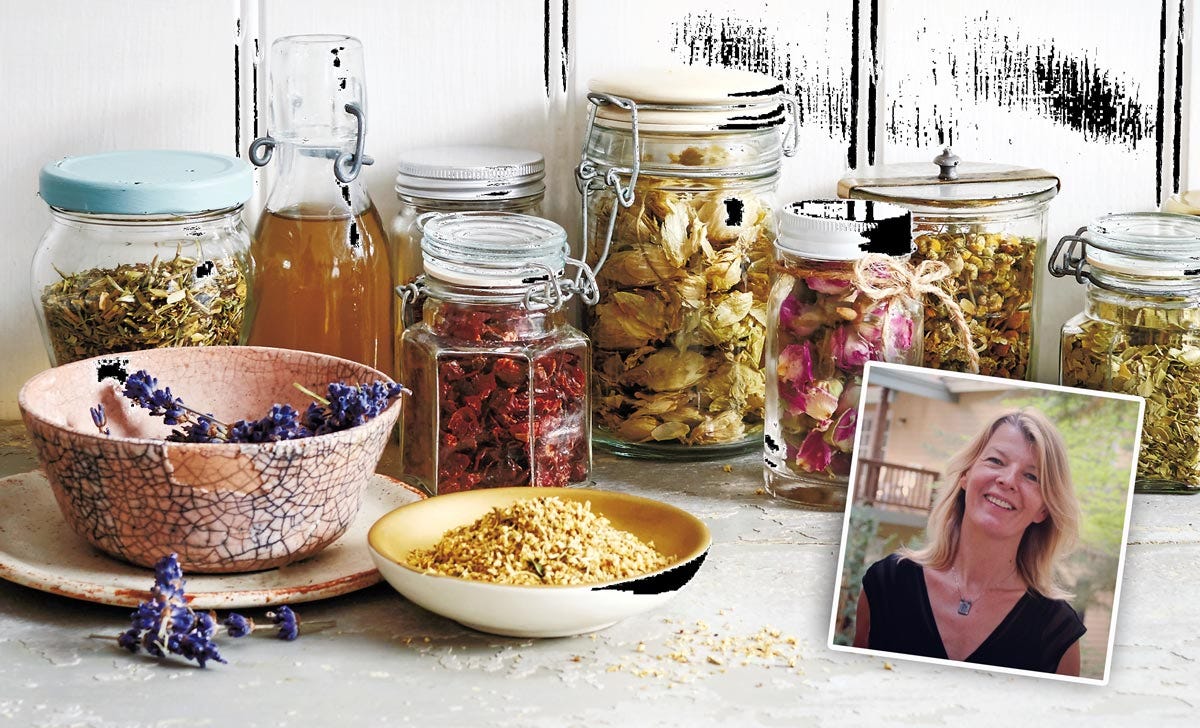
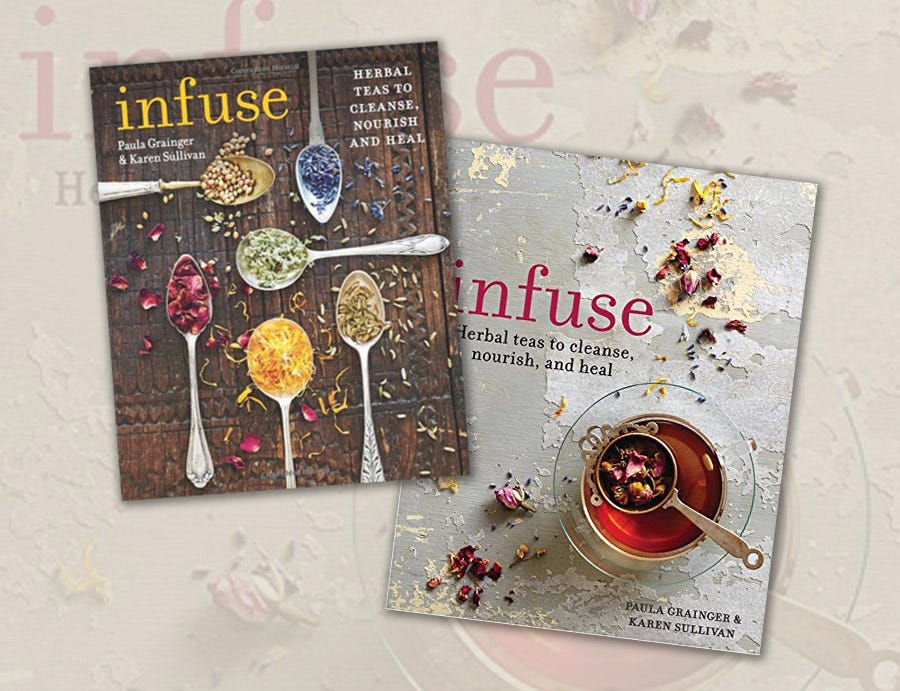
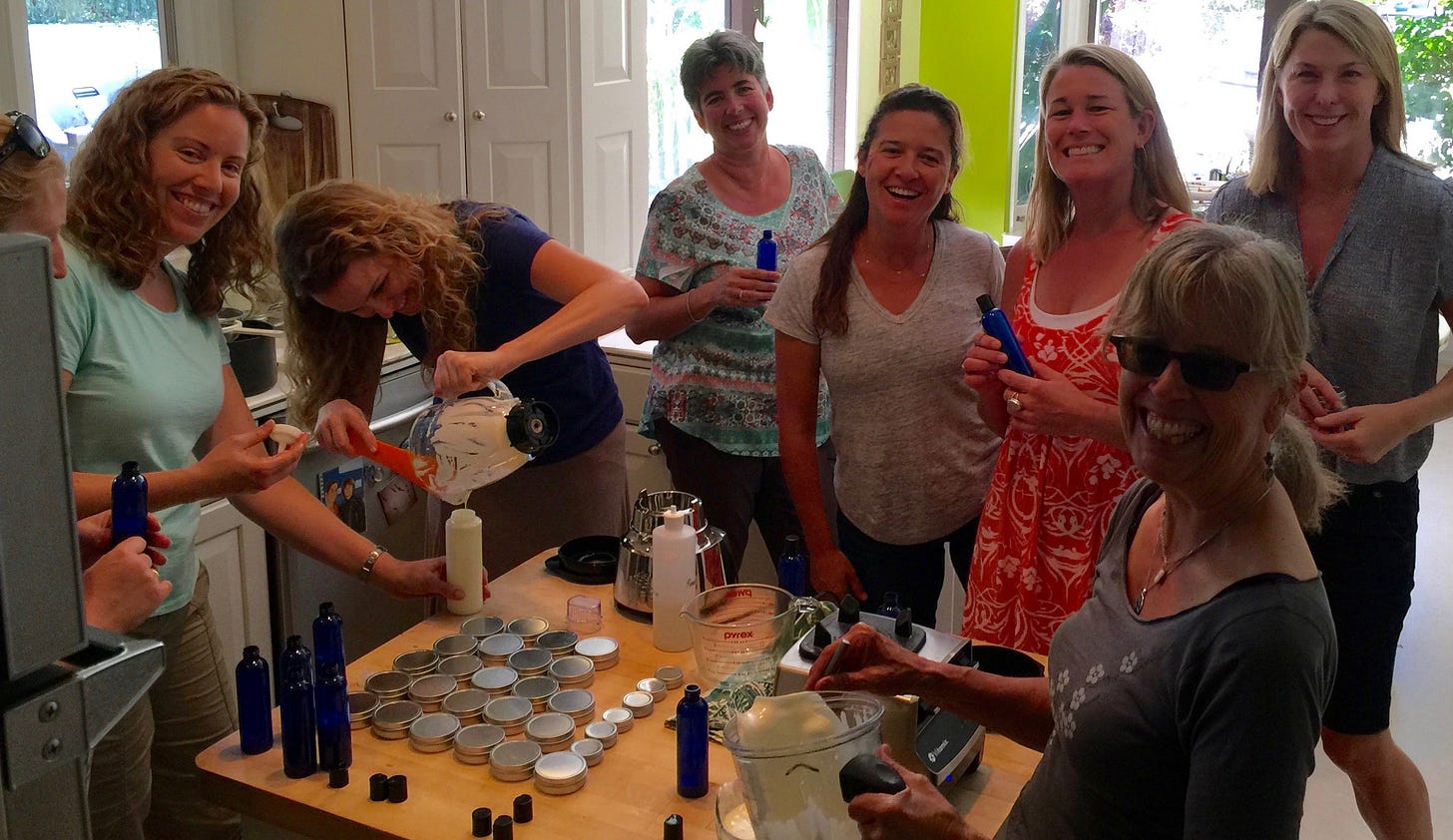
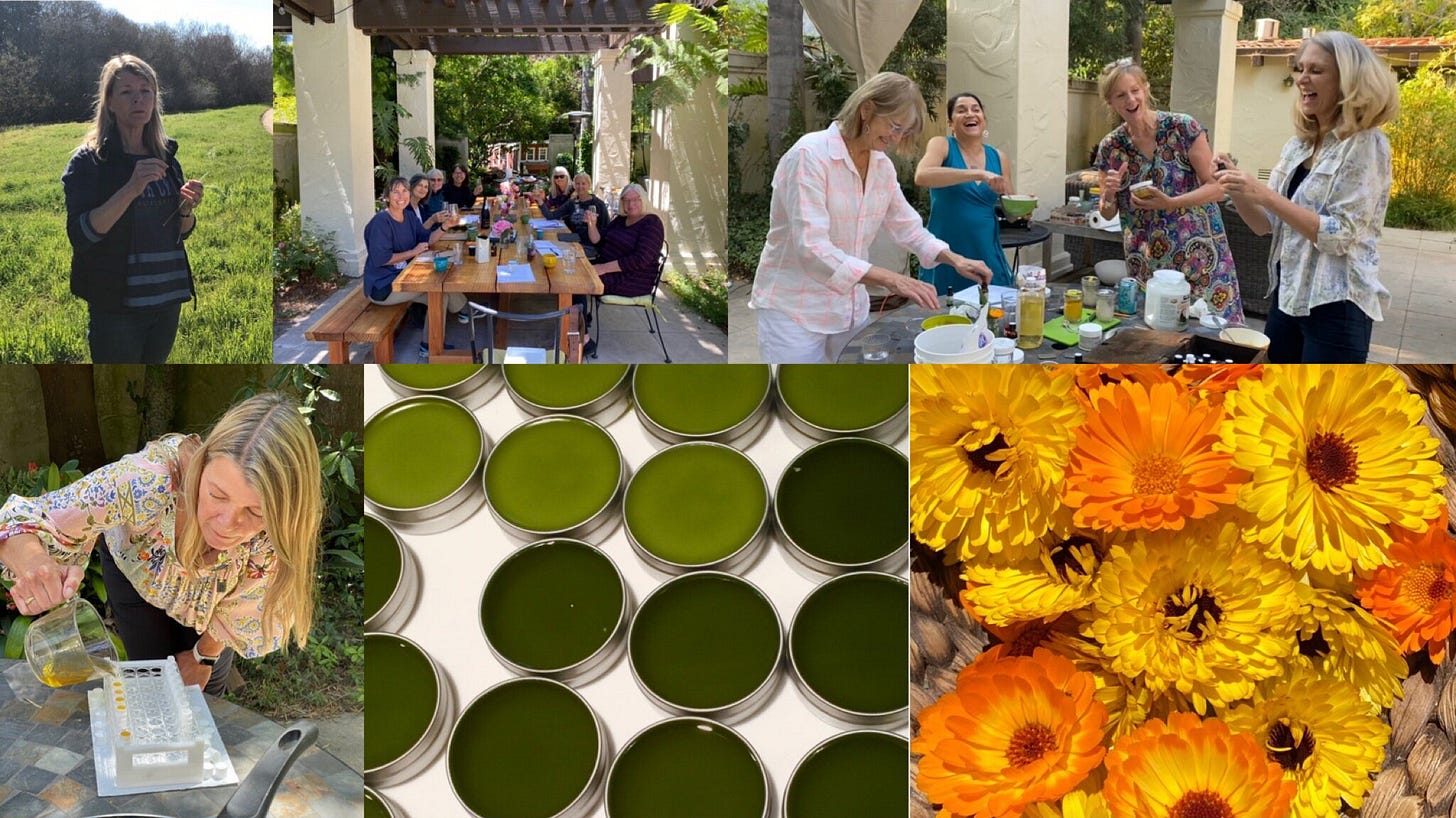
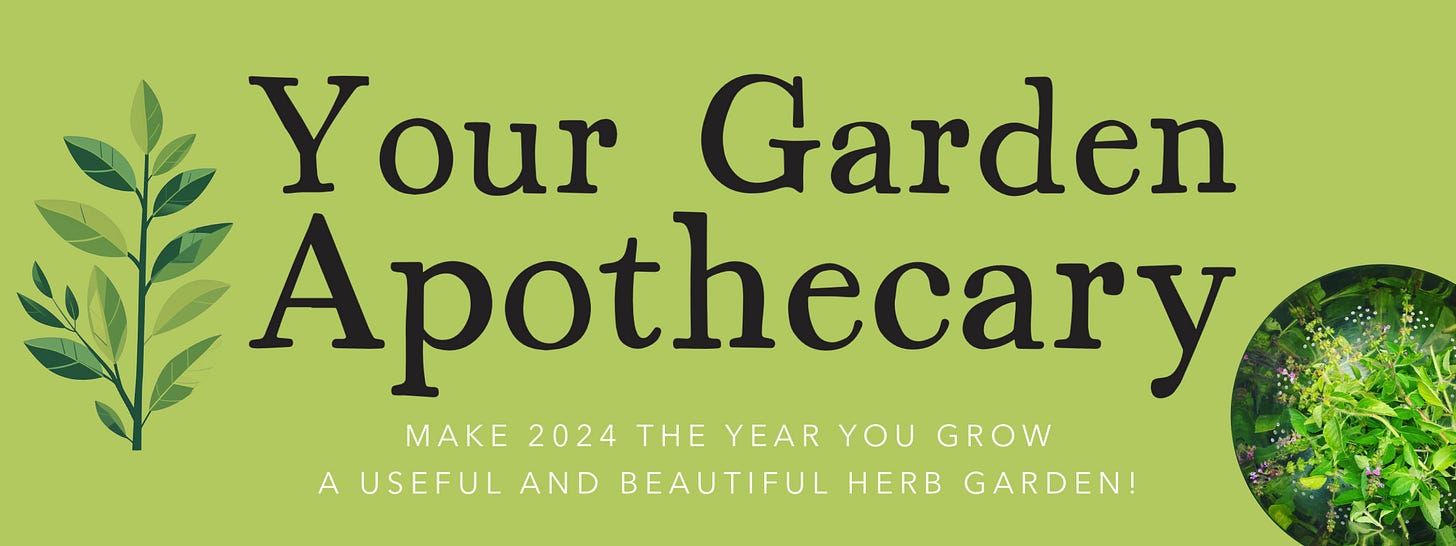

Hi, Michael!
I belong to the generation that stubbornly wandered the woods far and wide, forming and feeding their curiosity about the world around them.
Since then I have always been interested in plants. Not only as a natural remedy. Later I expanded my knowledge in the field with encyclopedias, books and lately with the Internet.
Surprised by the existence of Herbal Medicine degree at the University of Westminster in London, which trains qualified specialists in this field. Great luck for Paula… I was always aware that to make the most of the properties to your advantage, avoiding serious trouble,
it is recommended to turn to specialists.
P.S. 1. From personal experience I have learned that some plants are not mixed with others, so as not to compromise their compatibility.
2. And that herbal treatments are not compatible with traditional medicine. The use of drugs and plants at the same time can create more trouble than benefits.
It would be very interesting to hear the opinion of a specialist. So sorry…..I would gladly ask Paula.
Thanks in advance…
So great to read! And I'm glad that Paula has something new out. I bought "Infuse" based on you mentioning it in a post years ago. And I am happy I did! I will definitely check out Nature's Apothecary! And I'm so glad that both of you are still fighting the good fight!